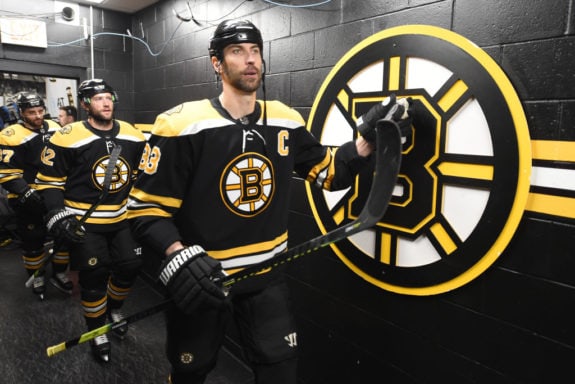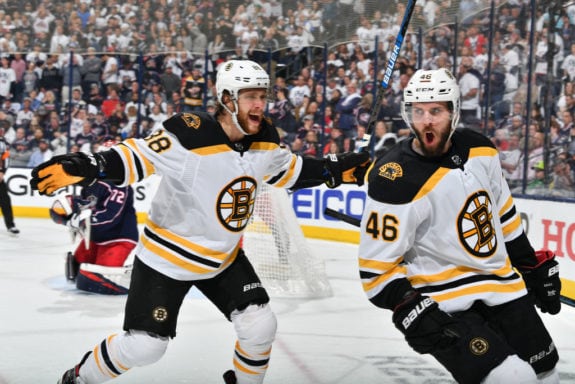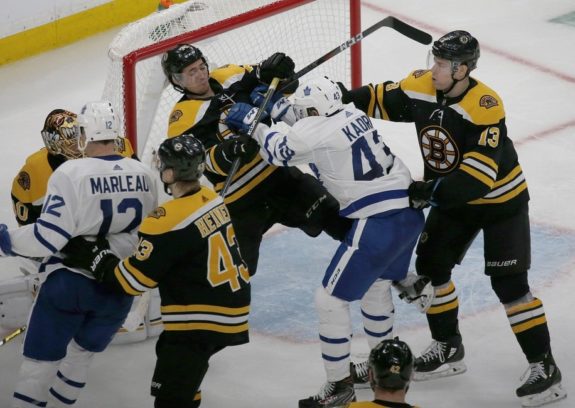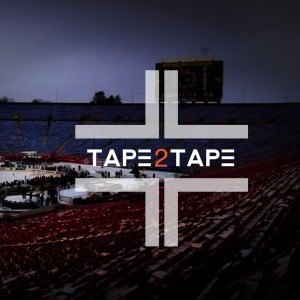I’m not a conspiracy theorist by any means. In fact, give me the chance to debunk conspiracies and I’ll do my best to do so. That said, there’s something fishy going on with the officiating surrounding the Boston Bruins thus far in the NHL’s postseason.
Say what you will about their style of play and the difference between regular season hockey and playoff hockey, but the lack of calls going against the Bruins are a complete 180-degree shift from what was happening in the regular season – and not because the Bruins have changed their style of play. The calls just simply aren’t being made.
Bruins’ Regular Season
Consider this. According to Fox Sports, in 82 games during the regular season the Bruins had 797 penalty minutes called against them. That was good enough for second overall in the league – behind only the New York Rangers (854). They averaged 9.7 penalty minutes (PIMs) per game and 9.9 penalty minutes against during the regular season.
On top of that, they finished with 27 major penalties over that 82-game span – just one less than the Rangers and second overall in the NHL. Seems like it would be tough to turn that all around just because it’s playoff time.

The Bruins power play operated at a rate of 25.9 percent on 251 opportunities, but gave up a league-high 15 shorthanded goals. That said, their penalty kill wasn’t nearly as good – shutting down just 79.9 percent of opposing power play opportunities, good enough for 16th overall in the NHL.
Still, they’ve been able to get through two rounds of the playoffs so far, stifling both the Toronto Maple Leafs and the Columbus Blue Jackets on their way to the Eastern Conference Final.
Related: Bruins Got the Goals & Goaltending They Needed to Advance
During the regular season, the Maple Leafs power play were eighth-best in the league at 21.8 percent, while the Blue Jackets operated at a clip of 15.4 percent. However, Columbus’ penalty kill was tops in the league (tied with Tampa Bay and Arizona) at an 85 percent success rate, while the Maple Leafs were tied with the Bruins in 16th.
So what changed in the postseason? Well, for one, the number of opportunities changed.
The Boston Bullies?
There’s no question that Zdeno Chara has had a tough time keeping up with the speed of opposing players this season – and it’s been far more evident in the postseason. But, given he’s been cleared to use hands to the face and slight hold-ups in the neutral zone, the game has catered to his diminishing speed.
So, forget for a second the regular season penalties that have gone unnoticed by the stripes during the Bruins’ playoff run, and let’s look at the actual numbers themselves.

So far, the Bruins have been tagged for 76 penalty minutes through 13 games in the playoffs, while opponents have been called for 93 minutes total over that span. That’s an average of 5.8 minutes per game for Boston, while their opponents have averaged 7.2 between them.
That’s a difference of nearly four minutes per game for the Bruins, while their opponents have averaged just two minutes fewer than during the regular season. The Bruins are averaging nearly 10 more hits per game from the regular season to playoffs and yet the majority of them have been deemed reasonably clean – aside from Charlie McAvoy’s in Game 6 against the Blue Jackets.
Now, looking at their special teams, the Bruins have scored 10 goals on the power play – tied for most in the postseason. They’ve had 35 opportunities which is sixth most of any team in the playoffs and have a success rate of 28.6 percent which is tops in the league.
As for their penalty kill, they are – once again – sixth best in the NHL operating at a rate of 83.8 percent on 37 opportunities.

While Game 2 against the Maple Leafs can certainly be used as an example of how officiating let things get out of control, Game 6 against the Blue Jackets is another example of a call that was made in favour of the Bruins.
McAvoy: Playing Too Big For His Own Good
At this point, we’ve all seen the hit. If you haven’t, feel free to look it up. McAvoy came across the ice as Josh Anderson entered the zone and the Bruins’ defenceman caught him with a high hit. The hit was more of an east-west angle and not head on, and seemed to find Anderson’s head as the principle point of contact.
At the time, the Jackets were down 1-0 in a pivotal, must-win game. Still, while it was called an illegal check to the head, the Bruins’ defenceman was handed a two-minute minor and Columbus was given a short power play. You guessed it, the Blue Jackets weren’t able to capitalize on the opportunity and eventually lost the game 3-0.
Now, there was a moment following the game in the handshake line in which McAvoy apologized to Anderson. And while it was a classy move by the young defenceman, the questions surrounding the officiating aren’t being brought up out of hatred for McAvoy. Rather there are questions of whether or not it would be beneficial to the NHL to have a Carolina Hurricanes and Columbus Blue Jackets conference final or if the Bruins’ appearance against the Hurricanes would draw more revenue.
Related: The NHL’s Department of Player Safety – A Model of Inconsistency
I think it’s fair to say that McAvoy wasn’t intentionally looking to injure Anderson – he was attempting to make a hit and caught the Blue Jackets forward in a vulnerable position, but the fact remains. The NHL instituted Rule 48.1 to protect players from taking hits directed at the head.
In case you need to be reminded, here’s what the NHL defines as Rule 48.1:
A hit resulting in contact with an opponent’s head where the head was the main point of contact and such contact to the head was avoidable is not permitted. In determining whether contact with an opponent’s head was avoidable, the circumstances of the hit including the following shall be considered:
(i) Whether the player attempted to hit squarely through the opponent’s body and the head was not “picked” as a result of poor timing, poor angle of approach, or unnecessary extension of the body upward or outward.
(ii) Whether the opponent put himself in a vulnerable position by assuming a posture that made head contact on an otherwise full body check unavoidable.
(iii) Whether the opponent materially changed the position of his body or head immediately prior to or simultaneously with the hit in a way that significantly contributed to the head contact.
But as former referee, Kerry Fraser, points out, the only options for officials is a two-minute minor or match penalty for deliberate intent when it comes to checks to the head. With that, it’s clear the decision was made to leave the call up to the Department of Player Safety on further punishment to McAvoy – which will likely come down in the coming days.
Like I said in the opening, I’m not one for conspiracies and the Bruins are a tough team to play against – ask anyone that has gone up against them. That said, it’s hard to argue the number and maybe it’s as simple as a shift in officiating come playoff time.
Regardless of how you look at it, there are three things that you can’t argue. The Bruins are off to the third round where they will meet the Hurricanes in the conference final. The Blue Jackets are headed home for the summer and Charlie McAvoy likely won’t be in the lineup when the puck drops against Carolina – at least for one or two games.

Tape2Tape is a column looking at some of the biggest stories from around the world of hockey. Discussing different topics, it focuses on delivering some opinion to hockey’s biggest fans. Whether you agree or disagree, we would love to hear your thoughts.